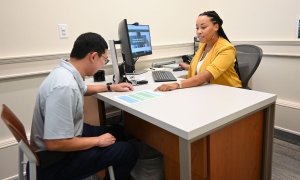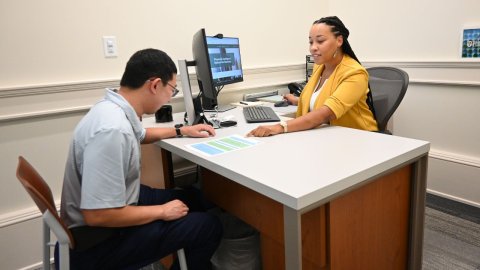Newsroom
Latest News
 Alumni,College in Prison,Faculty, Graduate, Information Technology, Public Administration, Staff, Student, Undergraduate,Humanities & Social Sciences,Information Technology
Alumni,College in Prison,Faculty, Graduate, Information Technology, Public Administration, Staff, Student, Undergraduate,Humanities & Social Sciences,Information TechnologyTop 5 headlines of 2025
December 19, 2025From student achievements to milestone moments across our programs, these five stories capture the innovation, impact and community that defined SoPA in 2025.

Commitment to community: Public administration program celebrates 5 years
November 11, 2025The John Lewis Public Administration Program at Tulane reaches its five-year milestone.

5 reasons to contact your financial aid counselor
October 01, 2025Tulane SoPA’s Assistant Director of Financial Aid, Katie Swan, shares five reasons students should utilize their financial aid counselor.

Halima Leak Francis honored with Spirit of Tulane Award
September 18, 2025Halima Leak Francis, PhD, director of Tulane SoPA’s John Lewis Public Administration program was recognized for her service to the university

ABA Journal features SoPA program director
September 04, 2025Robyn Ice, senior professor of practice and program director is featured in this month’s ABA Journal for her role as chair of the ABA Standing Committee on Paralegals’ Approval Commission.

SoPA grad featured on alumni podcast
August 29, 2025On episode four of the Bea Field Alumni Podcast, Tulane SoPA alumna Nicole Taffaro Bush (UC ’95, SoPA ’20) spoke on her experience as a Tulane student and where she is today.
 Applied Business Studies, Education, Emergency & Security Studies, General Legal Studies, Graduate,Humanities & Social Sciences, Information Technology, Kinesiology,Media & Design, Public Administration, Student, Undergraduate,SoPA News
Applied Business Studies, Education, Emergency & Security Studies, General Legal Studies, Graduate,Humanities & Social Sciences, Information Technology, Kinesiology,Media & Design, Public Administration, Student, Undergraduate,SoPA NewsTulane SoPA accepting applications for Student Advisory Board
August 28, 2025Tulane University’s School of Professional Advancement (SoPA) is now accepting applications for its Dean’s Student Advisory Board, a group created to give students a direct voice in shaping the school’s programs, services and operations.

Tulane SoPA faculty study highlights lasting impact of Katrina-era giving
August 26, 2025The unprecedented wave of philanthropy that followed Hurricane Katrina not only fueled New Orleans’ immediate recovery but also transformed the city’s nonprofit sector, strengthening the city’s resilience over the past two decades, according to a new study by a Tulane University faculty member.

SoPA Recent Alumni Council seeks new members
August 19, 2025The Tulane School of Professional Advancement (SoPA) is now accepting applications for membership on its Recent Alumni Council. The Council brings together alumni who serve as a resource for Dean Amelia Manning by offering feedback on their student experiences and by strengthening SoPA's connections to their professional and personal networks.

New McGrail Scholarship provides support to active duty, veteran students at Tulane SoPA
June 06, 2025The fund provides $45,000 of financial support over five years for active duty, reserve, National Guard, and honorably discharged veteran students from any U.S. uniformed service pursuing undergraduate or graduate studies through Tulane SoPA programs.
SoPA In The News

How Did the U.S. Patrol the Caribbean for Drug Smuggling Before It Started Blowing Up Boats?

What Should Entrepreneurs Be Doing Now to Prepare for Small Businesses Saturday?

Tulane SoPA : Keep kids safe from online exploitation; especially with AI


FEMA remains on the chopping block, even after the deadly Texas Hill Country floods

Attack on Michigan church again highlights vulnerability of some places of worship

FEMA funding cuts could threaten preparedness for future storms, experts say

By blowing up a suspected cartel boat, the US signaled it's bringing War on Terror tactics to the drug war




